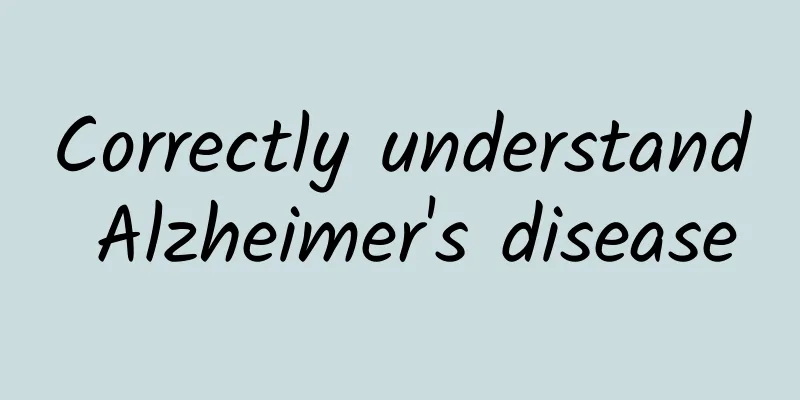Correctly understand Alzheimer's disease

|
Alzheimer's disease is a primary degenerative disease of the central nervous system. Patients experience persistent and comprehensive intellectual impairment while being conscious, manifested as a decline in memory, calculation, judgment, attention, abstract thinking ability, language function, emotional and behavioral disorders, and loss of the ability to live and work independently. Among them, Alzheimer's disease is the most common type. Alzheimer's disease usually occurs after the age of 65. The onset is not easy to detect and the development is slow. The earliest stage is often the gradual increase of forgetfulness. Some elderly people say: "Oh! As people get older, their memory becomes worse!" This may be a precursor to Alzheimer's disease. 1. What are the daily manifestations of Alzheimer's disease? (1) Memory gradually declines, especially recent memory, which affects daily living activities, such as adding salt twice when cooking or forgetting to turn off the gas after cooking. (2) Having difficulty completing familiar tasks, such as having difficulty doing daily housework, not knowing the order in which to get dressed, or the steps in cooking. (3) Becoming increasingly confused about time, place, and people, such as not remembering what day it is or which province one is in. (4) Difficulty expressing oneself, such as forgetting simple words, spoken words or written sentences. (5) Often put things in inappropriate places, such as putting an iron in a washing machine. (6) Judgment ability gradually decreases, such as wearing a cotton jacket under the scorching sun and a single layer of clothing in the cold winter. (7) Decreased ability to understand or arrange things rationally, such as being unable to follow the train of thought of others or being unable to pay various bills on time. (8) Emotional instability and abnormal behavior, such as rapid mood swings and becoming moody. (9) Changes in personality, such as becoming suspicious, indifferent, anxious, or rude. (10) Loss of initiative to do things, such as wasting time all day and losing interest in previous hobbies. 2. What should I do if the elderly in my family suffer from Alzheimer's disease? (1) Supervise treatment, take the elderly to the hospital for regular check-ups, and follow the doctor's advice. (2) Continue to accompany him as always. Family love will not change because of illness. (3) Tolerate him, care for him, and love him. (4) Give him more time, give him more encouragement, and don’t blame him when he makes mistakes. (5) Adjust your pace to his own and chat, do chores, and play games with him. 3. How to deal with memory impairment in patients with Alzheimer's disease? Memory impairment is a common symptom in patients with Alzheimer's disease, which manifests as the inability to remember words and things, unable to find the way home when going out, and the ability to recall things that happened a long time ago but often forgetting recent events. (1) When dealing with forgetful elderly people, we should encourage them more, avoid scolding them loudly, and ask them repeatedly about things they easily forget. (2) Use reminders such as notes, calendars, alarm clocks, etc. to aid memory. (3) Mark furniture and objects in your home or in frequently visited environments, such as by indicating directions and names. This will help with orientation and reduce the frustration caused by forgetting words. (4) Carry a memo and write down important information, such as name, phone number, etc., to help remind you. (5) Try to use simple and clear words when talking to the elderly. (6) When going out, the elderly person should be accompanied by someone and a note with the elderly person’s situation, home address and contact number should be placed in the pocket to facilitate contact with family members if the elderly person gets lost. (7) Make a daily plan and arrange your daily life in a certain order to avoid chaos caused by unexpected events. (8) Plan daily life and choose the time of the day when the elderly are in the best condition to deal with certain complex matters. 4. How to deal with cognitive impairment in patients with Alzheimer's disease? Cognitive impairment is a common symptom of Alzheimer's disease, manifested as memory loss, forgetfulness, repetition problems, difficulty finding words, personality changes, impaired living ability, etc. The following methods can help cope with cognitive impairment in Alzheimer's patients: (1) Help the patient recall past events. (2) Try to arrange life according to the patient’s past living habits. (3) Provide more training and guidance to patients to do things in daily life that they can do. (4) Taking patients out to participate in group activities more often is helpful in improving cognitive function. 5. How to deal with language communication barriers in patients with Alzheimer’s disease? Language communication barriers are a common problem for patients with Alzheimer's disease. Sometimes they have difficulty finding the right words to express themselves, and they also have difficulty understanding what others say. This directly causes communication barriers with people around them, making patients feel lonely and misunderstood. The following methods can improve language communication with patients with Alzheimer's disease: (1) When talking to the patient, look at him/her and let the patient focus on listening to you. (2) The content is positive, direct, and simple, and only talks about one thing at a time. (3) When the patient cannot remember, give him/her prompt reminders to reduce frustration. (4) If the patient makes a mistake and insists on his own opinion, do not argue with him or try to correct him. (5) If the patient does not understand, repeat the sentence twice or use pictures to convey the meaning. (6) Avoid rushing the patient and leave yourself and the patient the necessary time to communicate. 6. How to deal with sleep disorders in patients with Alzheimer’s disease? Alzheimer's patients are prone to sleep disorders such as reversal of sleep schedules due to environmental changes, physical discomfort, hallucinations, delusions and other symptoms. Their sleep disorders should be improved from the following aspects: (1) Create conditions for falling asleep, such as a quiet environment, fresh air, and a suitable temperature. (2) Pay attention to sleep conditions, record the time you fall asleep, and track your psychological reactions. (3) Understand the cause of insomnia. If insomnia is caused by mental symptoms or physical discomfort, appropriate sedatives or hypnotics can be given as prescribed by the doctor, and the doctor should explain the cause patiently, strengthen psychological care, and eliminate emotions such as fear and anxiety. (4) For patients with reversed sleep schedules, try to reduce sleep time during the day and encourage them to go for a walk outdoors, watch TV, etc.; when going to bed at night, avoid excitement, keep the bed comfortable and the surrounding environment quiet, create good sleeping conditions for the patient, and take sleep-aiding drugs as prescribed by the doctor when necessary. 7. How to deal with behavioral disorders in patients with Alzheimer's disease? In the early stages of the disease, behavioral disorders in patients with Alzheimer's disease are mainly manifested as behavioral tension, and as the disease progresses, irritability, impulsiveness, and aggressive behavior may occur. These behaviors increase the burden on family members and caregivers and make them feel distressed. (1) Try to identify the factors that caused the behavioral change and avoid its recurrence. (2) Comfort the patient through conversation and caressing to help him stay calm and avoid anger. (3) Take the patient to participate in favorite activities to distract his attention. (4) Actively encourage the patient's positive behavior and do not punish the patient for any behavior. (5) If the patient likes to hide things, try to find their pattern, what they like to hide and where they hide it, then you will definitely make important discoveries. (6) If the patient exhibits aggressive behavior, try not to scold or provoke them; instead, stand in the patient’s shoes and consider their feelings. (7) Sudden impulsive and aggressive behaviors will cause pain and exhaustion to family members and caregivers. They should find ways to relieve their emotions, take the patient to a psychiatric hospital as soon as possible, and use appropriate medication as prescribed by the doctor. |
<<: How Much Do You Know About Lung Cancer?
>>: Prevention and care of Alzheimer's disease
Recommend
When will postpartum swelling disappear?
The last period after pregnancy is the delivery p...
What are the reasons for leucorrhea with odor after menstruation?
In our daily life, women can wear beautiful skirt...
Luotu Technology: From January to July 2024, the cumulative sales volume of smart audio glasses in China's online market will reach 70,000 units, a year-on-year increase of 45.3%
According to recent news, Luotu Technology releas...
There are five principles of longevity diet
The Compendium of Materia Medica points out that ...
What is pelvic bleeding?
The pelvis generally refers to a woman's uter...
How long does it take to resume normal exercise after a hysterectomy?
In fact, in daily life, many female friends suffe...
How nutritious is corn juice? How to make three kinds of fruit and vegetable corn juice
Corn is rich in lutein, which is a good antioxida...
How long after giving birth should I take supplements?
The bodies of postpartum mothers are very weak an...
Sensor Tower: Insights into the social application market in 2024
With the popularity of short videos and the itera...
How to solve sagging breasts?
Postpartum breast sagging is actually a common to...
Can I brush my teeth after an abortion?
I believe that many female friends have such an u...
Is habitual ankle sprain serious? How to prevent it?
Many friends who love sports will encounter such ...
What is the problem with ivy leaves turning black? How to solve the problem of ivy leaves turning black?
Ivy is very common in our daily life. Because it ...
Why didn’t my period come for a week?
Basically every woman will encounter the situatio...
What does pelvic mass mean?
The pelvic cavity is a woman's internal repro...









